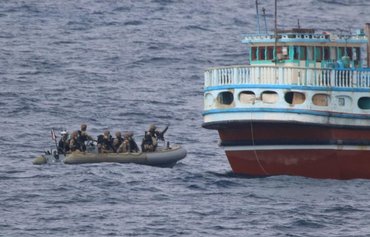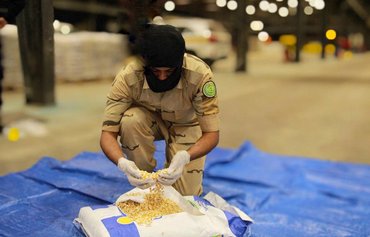US Navy and joint international forces stationed in the Red Sea, Gulf of Aden, Somali Basin, the Indian Ocean and the Gulf are key to ensuring regional security and the flow of global trade, experts told Al-Mashareq.
The Combined Maritime Forces (CMF) and US Naval Forces Central Command (NAVCENT) have been working to maintain the security of navigation through these waters, they said.
They aim to thwart the malign activities of Iran's Islamic Revolutionary Guard Corps (IRGC), its affiliated militias and criminal groups that rely on smuggling as a source of funding, the experts said.
The CMF is a multinational naval partnership, which exists to promote security, stability and prosperity across approximately 3.2 million square miles of international waters and some of the world’s most important shipping lanes.
![Illegal drugs seized by the Combined Maritime Forces (CMF) in the Indian Ocean. [Photo courtesy of CMF]](/cnmi_am/images/2019/01/03/16006-CMF-Indian-ocean-600_384.jpg)
Illegal drugs seized by the Combined Maritime Forces (CMF) in the Indian Ocean. [Photo courtesy of CMF]
The main focus of the 33-nation force is defeating terrorism, preventing piracy, encouraging regional co-operation, and promoting a safe maritime environment.
In December, the CMF seized five shipments of illegal drugs in international waters of the northern Arabian Sea.
Combined Task Force (CTF) 150 commander, Commodore Darren Garnier, said these efforts "demonstrate the value of international partnerships at sea and Combined Maritime Forces coalition efforts".
Thanks to these efforts, "significant quantities of narcotics will not reach their final destination, depriving terrorist organisations of revenue and profits they use to fund their illegal activities", he said.
Alliances to counter IRGC threat
The CMF are one the world's largest military alliances that operate to maintain security in the areas in which they are present, said Col. Rashid Mohammed al-Marri, formerly of the Dubai Police Anti-Narcotics Department.
The region is one of the most important for world commerce as it comprises vital routes for the regional and global flow of trade and commerce, such as Bab al-Mandeb and the Suez Canal, he told Al-Mashareq.
These routes have come under increasing threat from the IRGC and affiliated militias, especially after the recent US sanctions on Iran, he said.
"Iran seeks to circumvent [these sanctions] through smuggling by way of small boats that ferry goods to large ships anchored at sea," al-Marri said.
Any tension in these waterways would disrupt global financial sectors, particularly the oil sector, he said, adding that it would also affect trade since any delay in the delivery of perishable cargo could lead to its spoilage.
"The US NAVCENT plays a key role in the CMF's operations, due to their wide deployment in the region and their naval bases," he said.
In addition to operating through the CMF's operations room, US forces also have forged bilateral alliances with the countries of the region, especially Gulf states, al-Marri said.
This allows the US Navy to build a large shared database with those states to pursue any suspicious activity, "especially that which is carried out by the IRGC and affiliated groups", he said.
Thwarting sea smuggling
The Iranian regime funds the IRGC and its affiliated militias in the Middle East mainly through illegal activities such as maritime smuggling, said Sheyar Turko, who has been researching the financing of the IRGC.
"For example, drugs, pills and illegal narcotics are the main source of funding for the Lebanese militia Hizbullah," he told Al-Mashareq.
The militia has been trying to flood the Gulf markets with drugs in the past period, he said, especially after Hizbullah's funding activities have come under increased scrutiny recently.
In addition to drugs, Hizbullah and other IRGC militias rely on the illegal trade in counterfeit or smuggled goods, whose conduct requires a large fleet of fast and small maritime vessels, said Turko.
"IRGC factories excel at manufacturing these boats," he said, adding that the CMF must prevent the IRGC "from engaging in any maritime activities to circumvent the [US] sanctions".
The prevention of smuggling and piracy is an integral part of maritime security operations, as many criminal and terror groups are engaging in such activities to line their coffers, said terror group specialist and retired Egyptian officer Maj. Gen. Yahya Mohammed Ali.
"The most important task entrusted to the CMF and US NAVCENT is to police territorial waters in the Red Sea, Arabian Gulf and Gulf of Aden to prevent the conduct of illegal activities by the IRGC," he told Al-Mashareq.
"Iran is using international waters to carry out a number of illegal activities, including the smuggling of drugs, weapons and armed elements," he said.
The operations assigned to the CMF "undoubtedly undermine any external activity by the IRGC and stem its spread in the Mediterranean basin region and the Gulf", he said.

![In direct support to the Combined Task Force 152 maritime security mission, the Australian frigate HMAS Ballarat, US Coastguard cutters Adak and Maui and the Iraq Navy patrol boat 309 have conducted a successful period of joint operations in the Northern Gulf in late 2018. [Photo courtesy of CMF]](/cnmi_am/images/2019/01/03/16046-us-navy-cmf-600_384.jpg)







It was very good. Continue to your work in shedding light on this disgraceful, shameful, non-Iranian, non-Islamic Republic regime!
Reply2 Comment(s)
This is occupation of Yemen and Somalia under the pretext of Iran. Stop lying; the peoples have understood the plan, o, rascals!
Reply2 Comment(s)